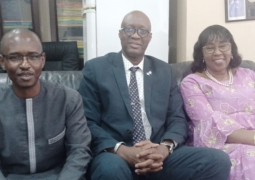
According to CG Darboe, Gambians need to embrace digitalisation, which is now a driving tool for GRA, saying that since the introduction of certain reforms through digitalisation, the Authority has been generating billions on monthly basis. “Now GRA is collecting over D2Billion on average monthly,” he said, attributing the success to the new reforms GRA has introduced.
He highlighted numerous reforms and digitalization that GRA has phased out and are in preparation to introduce the Integrated Tax Automated system which will be simple and the fastest way on reducing massive human interface with revenue collectors, avoiding dishonesty and encouraging transparency and effectiveness.
“At this day and age, the world is moving digitally, and GRA will not relent in its efforts in migrating from manual to digitalization,” he said. “This prompted the top Management of GRA to be frequently touring the continent to study new system of collecting revenue.” The coming of the ITAS system will serve as a game changer, he declared.
CG Darboe seized the opportunity to hail taxpayers, saying GRA cannot be successful in generating revenue in the absence of the taxpayers. “If there is no taxpayers, then there will be no GRA,” he said, adding that, they must contact the taxpayers through awareness creation with whatever plans they wish to introduce. “That is why GRA is organising series of sensitization meetings in order to equip the taxpayers with the necessary knowledge to be conversant with their new reforms.
Also speaking on the occasion, the deputy Commissioner General and head of domestic taxes, Ensa Jallow, said: “This Integrated Tax Administration System (ITAS) Sensitization seminar by GRA is part of the ongoing engagements we are having with critical stakeholders to introduce this information technology-related tax administration reform.”
He continued: “The ITAS is the main ICT-based technology we want to introduce to automate the domestic taxes processes so as to reduce the costs associated with tax compliance and administration. We expect this reform to also provide the necessary services for ease of tax payment and reduce the time spent on complying with tax obligations.
He said the seminar was not just about understanding the new system. “It is about embracing a new way of thinking about tax compliance and administration, one that prioritizes transparency, efficiency, and accountability,” he said.
“As we integrate modern technology into our tax processes, we will simplify our operations, reduce errors, and provide better services to our taxpayers.
“This reform will not only benefit our taxpayers and the tax administration, but it will also empower citizens to understand their tax obligations and ensure that our tax system is fair and equitable.”
There is growing recognition that the effectiveness of tax administrations cannot only be judged by the amount of revenue mobilised or indicators like revenue to GDP, he stated. “It is also important to make the tax administration taxpayer-focused by ensuring that it provides quality taxpayer services,” he said, adding: “This system does not only enhance operational efficiency; it also fosters transparency and trust between the taxpayers and government, hence lending support to the social contract between the citizens and government.”





